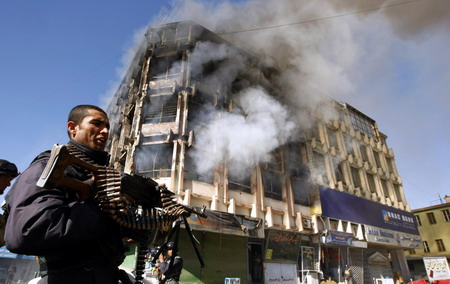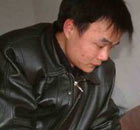Asia-Pacific
Afghans tighten security in Kabul after attack
(Agencies)
Updated: 2010-01-19 17:28
 |
Large Medium Small |
|
|
KABUL: Afghan forces tightened security in Kabul on Tuesday, a day after a brazen Taliban assault on the city center left 12 people dead and raised concerns about the government's ability to protect the people.
Troops searched vehicles entering the capital and increased the number of checkpoints in the city, along with foot patrols and vehicle patrols, said deputy police chief Mohammad Khalil Dastyar.
The assault by a handful of determined militants dramatized the vulnerability of the Afghan capital, undermining public confidence in the ability of the government and its US-led allies to provide security.
Mohammad Nasir, a taxi driver, said the government needs to do more to stop foreign attackers from crossing the border.
"They always say that these attackers are coming from outside, but they don't have wings to fly from the sky and come here, so they come from the ground," he said. "If we had professional Afghan forces, they could stop them ... but we see we don't have professional forces to keep them from coming."
NATO insisted the operation to secure the capital on Monday was Afghan-led, though it had explosives experts and other troops in supporting roles.
New Zealand's Prime Minister John Key said Tuesday that some of his country's troops were caught up in the fight.
"A small element of the SAS (special air service commandos) were among those who took up positions close to the incident," New Zealand Prime Minister John Key told reporters, adding their involvement was very limited. "They were quite a long way back from the building (where insurgents holed up) as I understand it."
New Zealand has five soldiers attached to the headquarters of NATO's International Security Assistance Force in Kabul and another 140 troops involved in provincial reconstruction and security in Bamiyan province northeast of Kabul.
Other NATO troops were on the ground Monday helping the Afghan forces with bomb disposal expertise, Lt. Nico Melendez, a NATO spokesman, said in an e-mail. He said Turkish troops were assisting in the city Tuesday as well but their presence was normal.
NATO military chief Adm. James Stavridis, who arrived in Kabul for a visit Monday as the attack was under way, lauded the Afghans for successfully containing the violence.
"Afghan national security forces effectively countered an insurgent attack in downtown Kabul," he said in a statement, adding the coordinated effort "highlights their improved effectiveness in protecting Afghan citizens."
The attacks also sent a message that the mostly rural Taliban are prepared to strike at the heart of the Afghan state, bringing the city to a standstill, even as the United States and its international partners are rushing 37,000 reinforcements to join the eight-year war.
It was the biggest assault on the capital since October 28, when three gunmen with automatic weapons and suicide vests stormed a guest house used by UN staff, killing at least 11 people including five UN workers. Taliban suicide bombers and gunmen also struck government buildings in the capital last February, killing more than 20 people.
But Monday's fighting persisted longer than any initiated by the Taliban in the capital since they were driven from power by the US and its allies in 2001.












